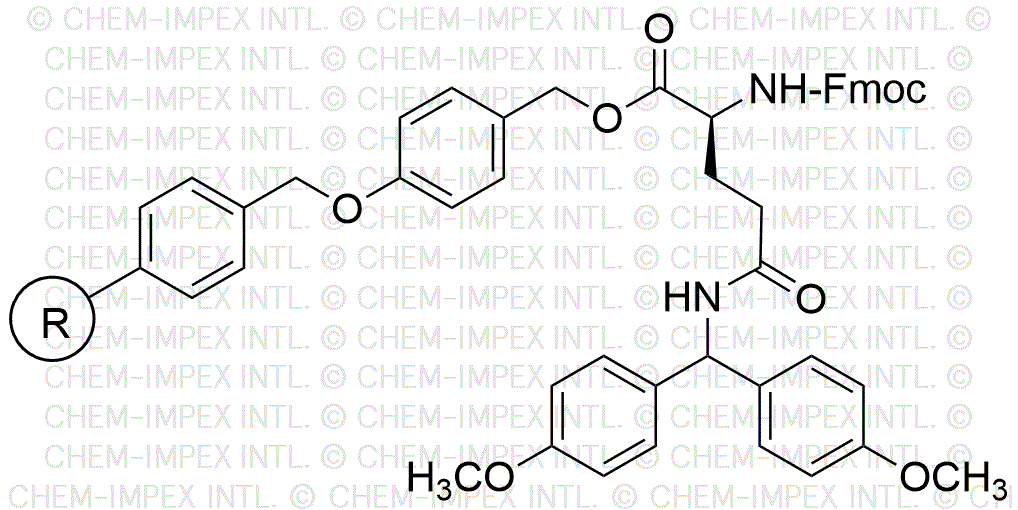Na-Fmoc-Nd-4,4'-dimethoxybenzhydryl-L-glutamine 4-alkoxybenzyl alcohol resin is widely utilized in research focused on:
- Peptide Synthesis: This resin is essential for solid-phase peptide synthesis, allowing researchers to efficiently create complex peptides with high purity and yield.
- Drug Development: It plays a crucial role in the pharmaceutical industry for developing peptide-based drugs, enabling the exploration of new therapeutic options.
- Bioconjugation: The resin is used in bioconjugation processes, facilitating the attachment of peptides to other molecules, enhancing drug delivery systems.
- Protein Engineering: Researchers utilize this resin in protein engineering to modify proteins for better functionality, stability, or targeting capabilities.
- Academic Research: It serves as a valuable tool in academic laboratories for studying protein interactions and functions, contributing to advancements in biochemistry and molecular biology.
Información general
Propiedades
Seguridad y normativas
Aplicaciones
Na-Fmoc-Nd-4,4'-dimethoxybenzhydryl-L-glutamine 4-alkoxybenzyl alcohol resin is widely utilized in research focused on:
- Peptide Synthesis: This resin is essential for solid-phase peptide synthesis, allowing researchers to efficiently create complex peptides with high purity and yield.
- Drug Development: It plays a crucial role in the pharmaceutical industry for developing peptide-based drugs, enabling the exploration of new therapeutic options.
- Bioconjugation: The resin is used in bioconjugation processes, facilitating the attachment of peptides to other molecules, enhancing drug delivery systems.
- Protein Engineering: Researchers utilize this resin in protein engineering to modify proteins for better functionality, stability, or targeting capabilities.
- Academic Research: It serves as a valuable tool in academic laboratories for studying protein interactions and functions, contributing to advancements in biochemistry and molecular biology.
Documentos
Hojas de datos de seguridad (HDS)
La SDS proporciona información de seguridad completa sobre la manipulación, el almacenamiento y la eliminación del producto.
Especificación del producto (PS)
La PS proporciona un desglose completo de las propiedades del producto, incluida la composición química, el estado físico, la pureza y los requisitos de almacenamiento. También detalla los rangos de calidad aceptables y las aplicaciones previstas del producto.
Certificados de análisis (COA)
Busque certificados de análisis (COA) ingresando el número de lote del producto. Los números de lote y de partida se pueden encontrar en la etiqueta de un producto después de las palabras "Lote" o "Lote".
Número de catálogo
Número de lote/lote
Certificados de origen (COO)
Este certificado de origen confirma el país en el que se fabricó el producto y también detalla los materiales y componentes utilizados en él y si se deriva de fuentes naturales, sintéticas u otras fuentes específicas. Este certificado puede ser necesario para cumplir con las normativas aduaneras, comerciales y regulatorias.
Número de catálogo
Número de lote/lote
Hojas de datos de seguridad (HDS)
La SDS proporciona información de seguridad completa sobre la manipulación, el almacenamiento y la eliminación del producto.
DownloadEspecificación del producto (PS)
La PS proporciona un desglose completo de las propiedades del producto, incluida la composición química, el estado físico, la pureza y los requisitos de almacenamiento. También detalla los rangos de calidad aceptables y las aplicaciones previstas del producto.
DownloadCertificados de análisis (COA)
Busque certificados de análisis (COA) ingresando el número de lote del producto. Los números de lote y de partida se pueden encontrar en la etiqueta de un producto después de las palabras "Lote" o "Lote".
Número de catálogo
Número de lote/lote
Certificados de origen (COO)
Este certificado de origen confirma el país en el que se fabricó el producto y también detalla los materiales y componentes utilizados en él y si se deriva de fuentes naturales, sintéticas u otras fuentes específicas. Este certificado puede ser necesario para cumplir con las normativas aduaneras, comerciales y regulatorias.


